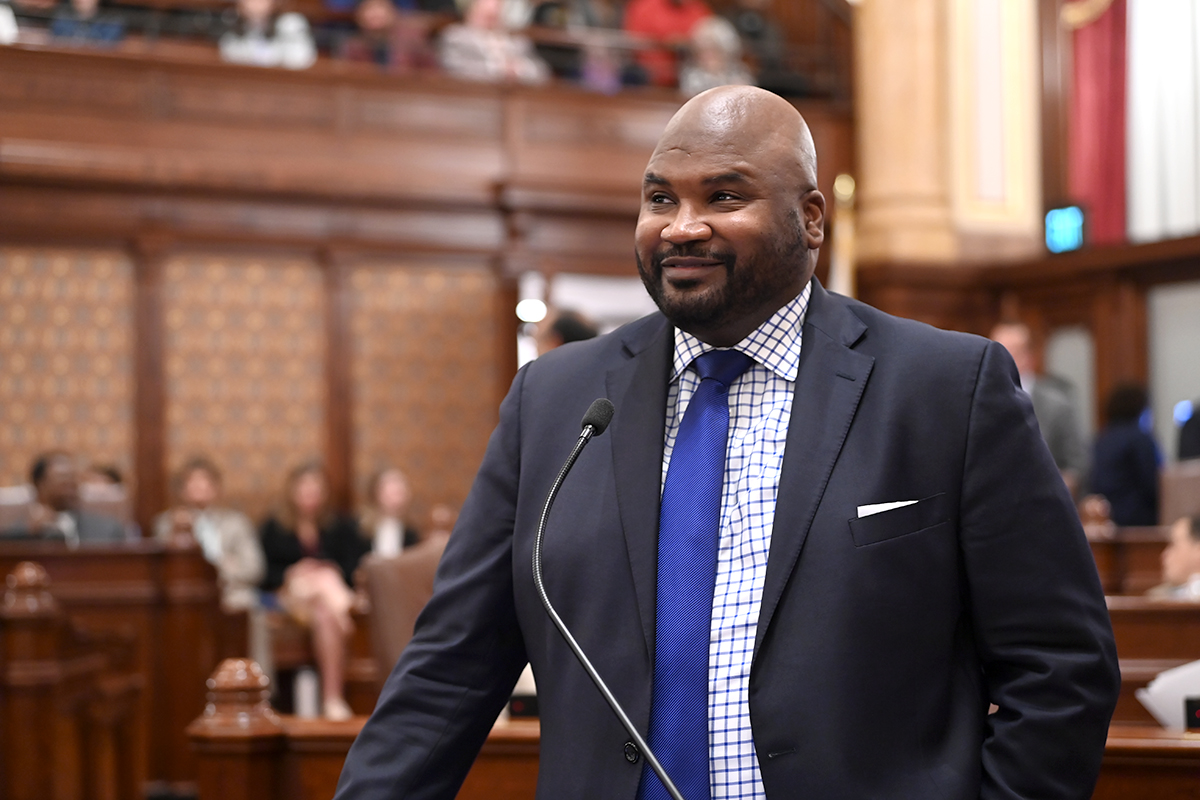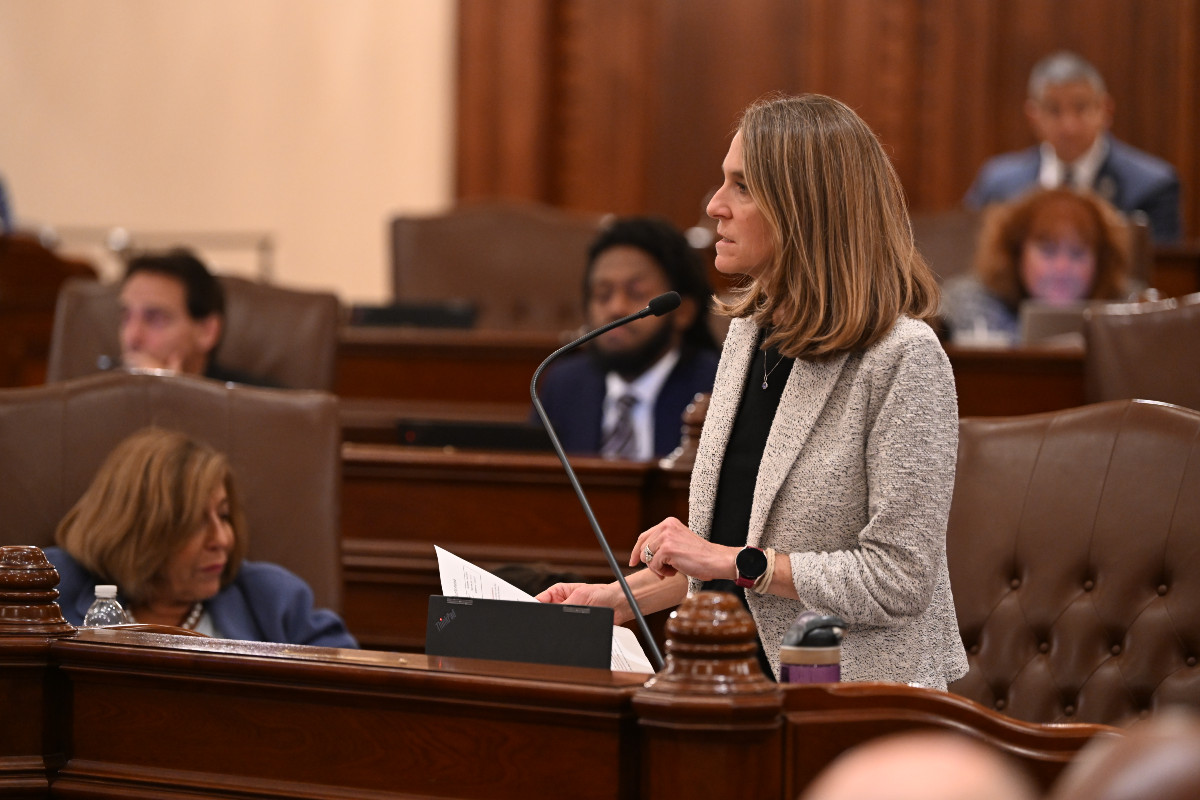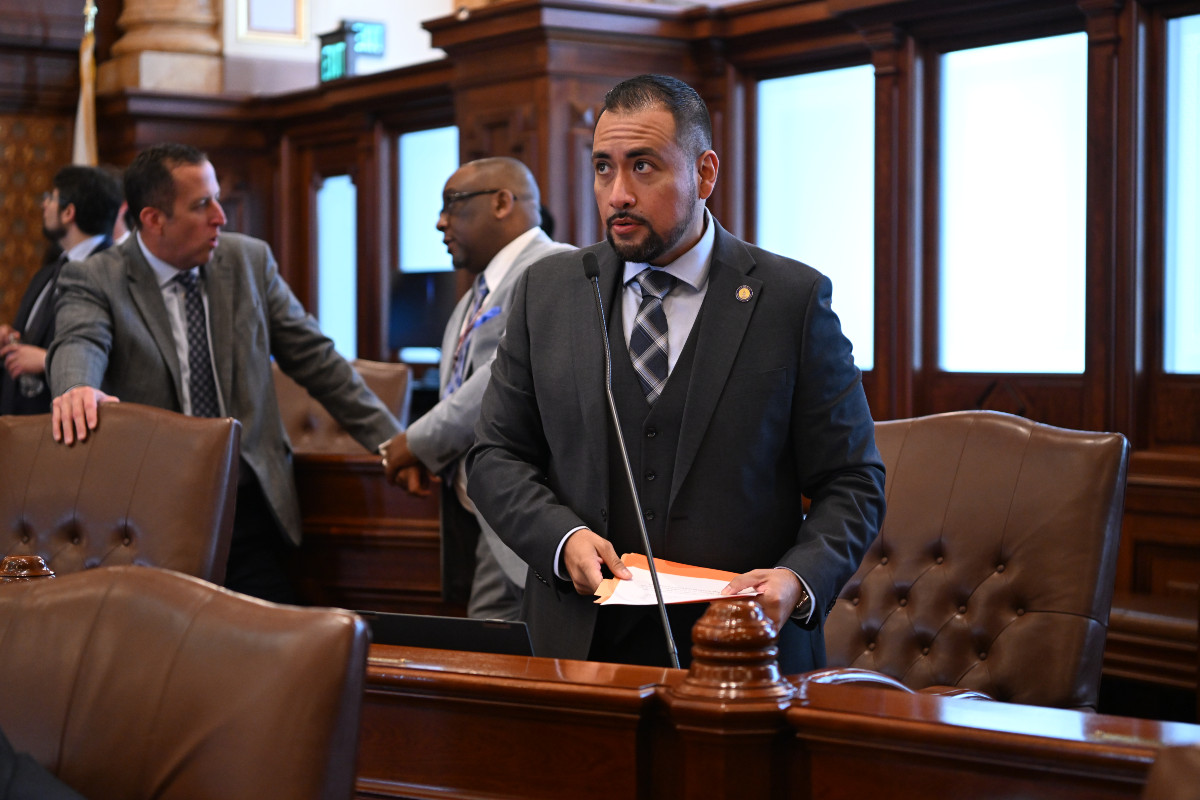- Details
- Category: Member News
 CHICAGO – Members of the Illinois Senate Democratic Caucus applauded the opening of a new training center for the International Alliance of Theatrical Stage Employees Local 2 Stagehands, thanks to a $5 million grant they backed.
CHICAGO – Members of the Illinois Senate Democratic Caucus applauded the opening of a new training center for the International Alliance of Theatrical Stage Employees Local 2 Stagehands, thanks to a $5 million grant they backed.
“If you’ve been to a great show or concert — or seen Chicago looking magnificent on the screen — it was made great in large part because of the work of IATSE Local 2,” said Senate President Don Harmon (D-Oak Park). “This facility ensures they’ll continue leading the way in skill, safety and innovation, preparing the next generation of professionals for the high-tech, high-skill jobs that quite literally keep the show going.”
The new training center comes after members of the Illinois Senate Democratic Caucus brought forth SB 1911 to strengthen the film and TV community by expanding the Illinois Film Production Tax Credit. The expansion will support good-paying jobs throughout the state with numerous enhancements, including an increased tax credit for local labor and Illinois vendors, incentives to relocate TV series to Illinois, regional production bonuses and more.
Read more: Illinois Senate Democrats celebrate the opening of IATSE Local 2’s new training center
- Details
- Category: Majority Report
Sims: Clean Slate Act is about creating pathways to opportunity for people who have earned a second chance
SPRINGFIELD — Marking a significant step forward in criminal justice reform, State Senator Elgie R. Sims, Jr. led a transformative approach to providing second chances while maintaining critical public safety protections.
"The Clean Slate Act is about creating pathways to opportunity for people who have earned a second chance," said Sims (D-Chicago). "By automating the sealing process for eligible records, we're removing unnecessary bureaucratic obstacles that keep people from finding employment, securing housing, and fully reintegrating into their communities. At the same time, we've been deliberate in maintaining strong public safety protections and ensuring law enforcement has the access they need."
Fine legislation addressing foster care liability coverage passes Senate
SPRINGFIELD — In order to protect community based foster care agencies from the increasing costs and the decreasing availability of liability insurance, State Senator Laura Fine passed legislation to analyze the current foster care liability insurance landscape in Illinois.
“Foster care and adoption services must maintain liability coverage to operate in the state,” said Fine (D-Glenview). “Without sustainable insurance options, these foster agencies are at risk of shutting down altogether.”
Cervantes legislation to protect immigrant workers passes Senate
SPRINGFIELD — At a time when immigrant workers are facing unprecedented surveillance and discrimination, State Senator Javier Loera Cervantes is fighting to protect employees from unfair retaliation from their workplace through new legislation.
“Every employee makes mistakes, especially when filling out confusing, lengthy paperwork,” said Cervantes (D-Chicago). “It is unfair to hold immigrant employees to a wholly different standard where making such a mistake can result in them losing their job. As many immigrants are more afraid of losing work because of their immigration status than ever before due to the current political climate, I am proud to be making one element of their lives less anxiety-inducing through this legislation.”

Celebrating Veterans Day
This Veterans Day, let’s come together to celebrate our service members for their patriotism, love of country and willingness to serve and sacrifice for the common good. We must also honor the veterans who made the ultimate sacrifice for our country – you will never be forgotten.
The men and women who serve in our military are nothing short of American heroes, and they deserve our utmost respect and gratitude. If you are currently serving or did a tour of duty in the past, thank you for your service. Your bravery and dedication to protecting American families and our greatest ideals is incomparable.

In case you missed it
MEMBERS IN THE NEWS
Senator Don Harmon, Oak Park: Advocates celebrate final passage of the Equality for Every Family Act | Windy City Times
Senator Michael E. Hastings, Frankfort: Illinois Sen. Hastings cold spa regulation bill passes House and Senate | Will County Gazette
Senator Julie A. Morrison, Lake Forest: Statewide act pushes Illinois from ‘F’ to ‘A’ on human trafficking report card | Yahoo
Copyright 2025 - Illinois Senate Democratic Caucus - All Rights Reserved
- Details
- Category: Senator Christopher Belt News
 VENICE – State Senator Christopher Belt joined leaders from across the Metro East region to break ground on a new grocery store in Venice as part of the Illinois Grocery Initiative — marking an important milestone in expanding access to fresh, affordable food for local residents. The groundbreaking represents a critical joint effort to revitalize the city, which was made possible through a $2.4 million state grant and private funding.
VENICE – State Senator Christopher Belt joined leaders from across the Metro East region to break ground on a new grocery store in Venice as part of the Illinois Grocery Initiative — marking an important milestone in expanding access to fresh, affordable food for local residents. The groundbreaking represents a critical joint effort to revitalize the city, which was made possible through a $2.4 million state grant and private funding.
“We have had some great days here in Venice, first for our bill signing, then to award this grant, and now we are here to put a shovel in the ground,” said Belt (D-Swansea). “I don’t have a crystal ball, but I think we’ll be here again when the grocery store is completed to celebrate what we have accomplished.”
In 2023, Belt championed legislation aiming to eliminate the number of food deserts in Illinois’ communities — leading to the creation of the Illinois Grocery Initiative and the current construction of a new grocery store in Venice.
Read more: Belt celebrates groundbreaking on new grocery store in Venice
Ellman commemorates opening of new Philip J. Rock Center and School facility for deaf-blind students
- Details
- Category: Senator Laura Ellman News

GLEN ELLYN — State Senator Laura Ellman joined local, state and community leaders to celebrate the grand opening of the new Philip J. Rock Center and School, the nation’s only publicly-funded residential school dedicated to serving students who are deaf-blind.
“As the only publicly-funded residential school in the country for students who are deaf-blind, the Philip J. Rock Center and School has helped students discover their strength and independence for generations,” said Ellman (D–Naperville). “I’m thrilled that Illinois is supporting this incredible place, ensuring its impact reaches even more families across our community.”
Funded through a $21.5 million investment from the Rebuild Illinois capital program, the new two-story, 24,173-square-foot facility combines residential and educational spaces under one roof. It will serve up to 20 full-time students, offering specialized classrooms, dormitories, after-school activity areas, and support spaces designed to meet the complex sensory needs of deaf-blind students. The campus also features new outdoor amenities, including a basketball court, playground, and electric vehicle charging stations.
- Details
- Category: Majority Report
Senate Democrats pass landmark legislation to enhance civil rights amid ICE activities
SPRINGFIELD — Senate President Don Harmon advanced legislation out of the Senate responding to infringements on personal liberty by federal immigration agents in Illinois.
“Masks might conceal their faces, but they can’t hide the constitutional abuses we’ve seen daily,” said Harmon (D-Oak Park). “This gives the growing number of victims a clear, legal path to go after the abusers and hold them accountable.”
Villivalam: Delivering a world-class public transit system that Illinoisans deserve
SPRINGFIELD — State Senator Ram Villivalam passed historic legislation through the Senate providing necessary reforms and transformational investments to address the public transit fiscal cliff in Illinois.
“Our public transit systems are the backbone of our communities – connecting residents to their jobs, schools, doctors and more,” said Villivalam (D-Chicago). “Now is the time to embrace viable, long-term solutions that provide a world-class public transit system to Illinoisans.”
Sims leads legislation to protect state budget from reckless federal cuts
SPRINGFIELD — In response to devastating cuts to essential programs by the federal administration, State Senator Elgie R. Sims, Jr. led a measure to decouple Illinois tax policy from harmful federal changes and protect the state's Fiscal Year 2026 budget.
"While the federal administration carelessly slashes funding for programs that Illinois families depend on, we refuse to let their recklessness blow a hole in our state budget," said Sims (D-Chicago). "This measure is about protecting Illinois taxpayers and ensuring we can continue funding schools, health care and vital services despite the chaos coming from the federal government."

In case you missed it
MEMBERS IN THE NEWS
Senator Linda Holmes, Aurora: ‘Right to die’ bill passed by Illinois lawmakers, awaits Pritzker’s signature | FOX 32
Senator Steve Stadelman, Rockford: Lawmakers OK sweeping energy reform package that governor pledges to sign | Capitol News Illinois
Senator Rachel Ventura, Joliet: State senate OKs bill to transfer Joliet prison land to Will County forest preserve district | Shaw Local
Copyright 2025 - Illinois Senate Democratic Caucus - All Rights Reserved
- Details
- Category: Senator Ram Villivalam News
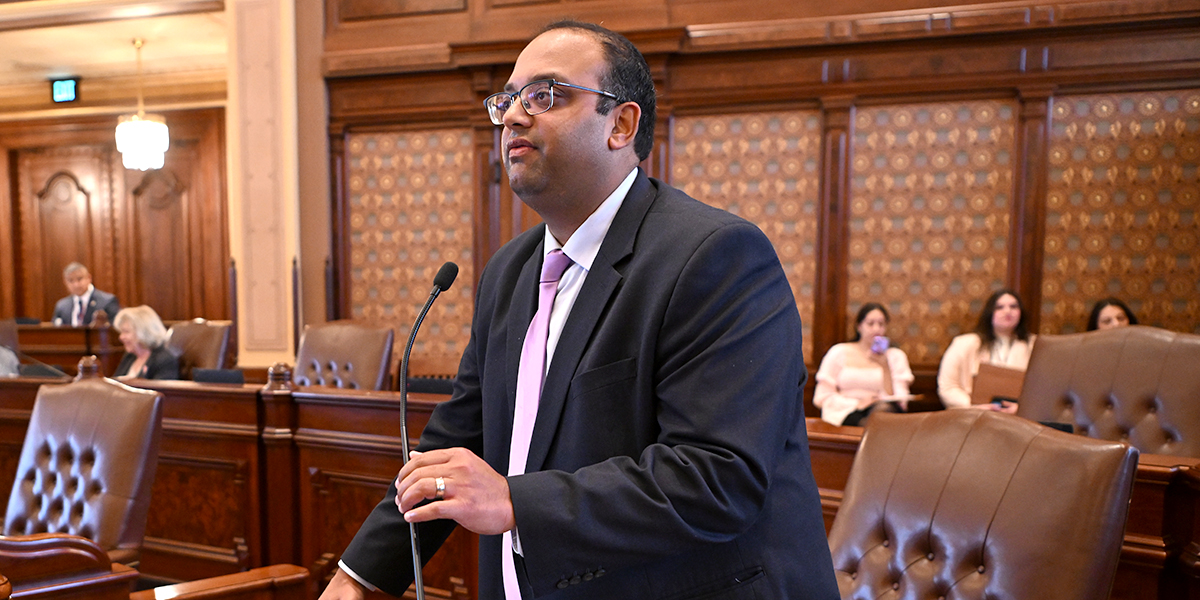 SPRINGFIELD ─ State Senator Ram Villivalam passed historic legislation through the Senate providing necessary reforms and transformational investments to address the public transit fiscal cliff in Illinois.
SPRINGFIELD ─ State Senator Ram Villivalam passed historic legislation through the Senate providing necessary reforms and transformational investments to address the public transit fiscal cliff in Illinois.
“Our public transit systems are the backbone of our communities – connecting residents to their jobs, schools, doctors and more,” said Villivalam (D-Chicago). “Now is the time to embrace viable, long-term solutions that provide a world-class public transit system to Illinoisans.”
Senate Bill 2111 would create the Northern Illinois Transit Authority, known as NITA – shifting authority from the Regional Transit Authority to the new entity that will oversee CTA, Metra and Pace. The NITA board would be comprised of 20 members, with five appointments each from the governor, mayor of Chicago and Cook County Board president, as well as one from each chair or county executive of the collar county boards of DuPage, Kane, McHenry, Lake and Will.
Read more: Villivalam: Delivering a world-class public transit system that Illinoisans deserve
- Details
- Category: Senator Elgie R. Sims Jr. News
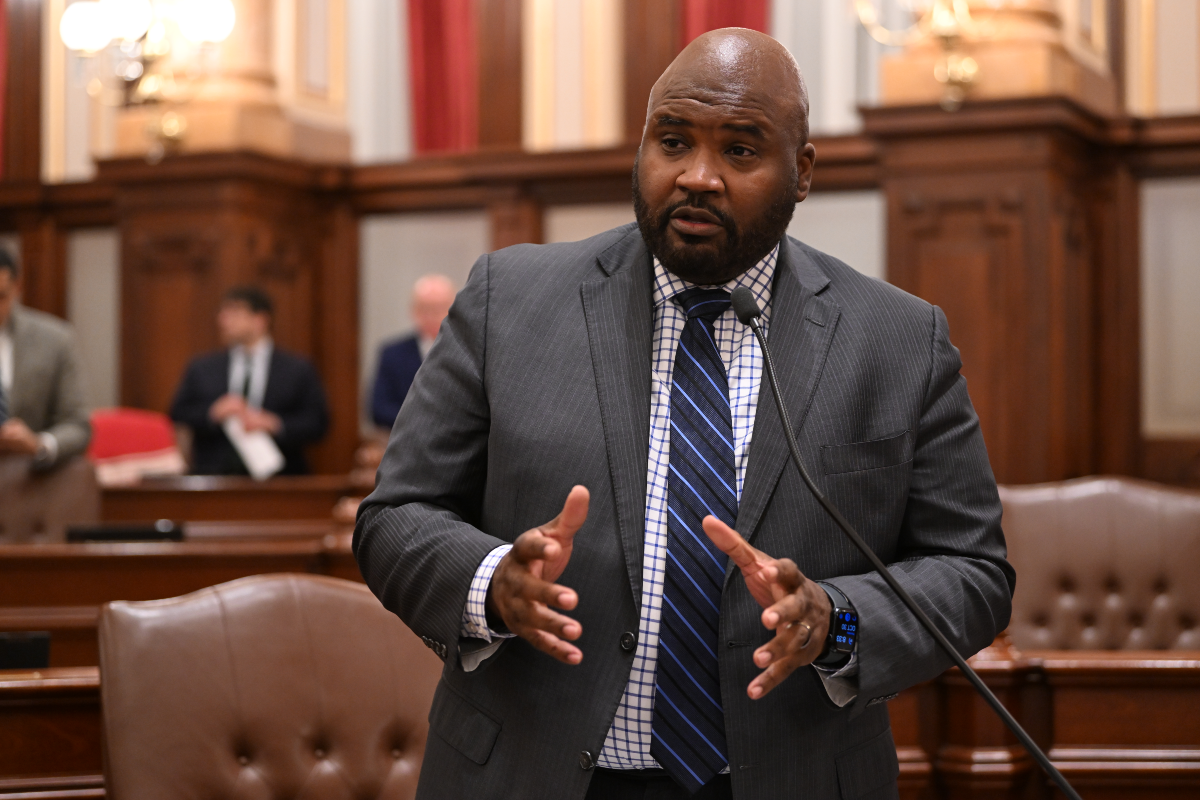 SPRINGFIELD – In response to devastating cuts to essential programs by the federal administration, State Senator Elgie R. Sims, Jr. led a measure to decouple Illinois tax policy from harmful federal changes and protect the state's Fiscal Year 2026 budget.
SPRINGFIELD – In response to devastating cuts to essential programs by the federal administration, State Senator Elgie R. Sims, Jr. led a measure to decouple Illinois tax policy from harmful federal changes and protect the state's Fiscal Year 2026 budget.
"While the federal administration carelessly slashes funding for programs that Illinois families depend on, we refuse to let their recklessness blow a hole in our state budget," said Sims (D-Chicago). "This measure is about protecting Illinois taxpayers and ensuring we can continue funding schools, health care and vital services despite the chaos coming from the federal government."
Read more: Sims leads legislation to protect state budget from reckless federal cuts
- Details
- Category: Senator Linda Holmes News
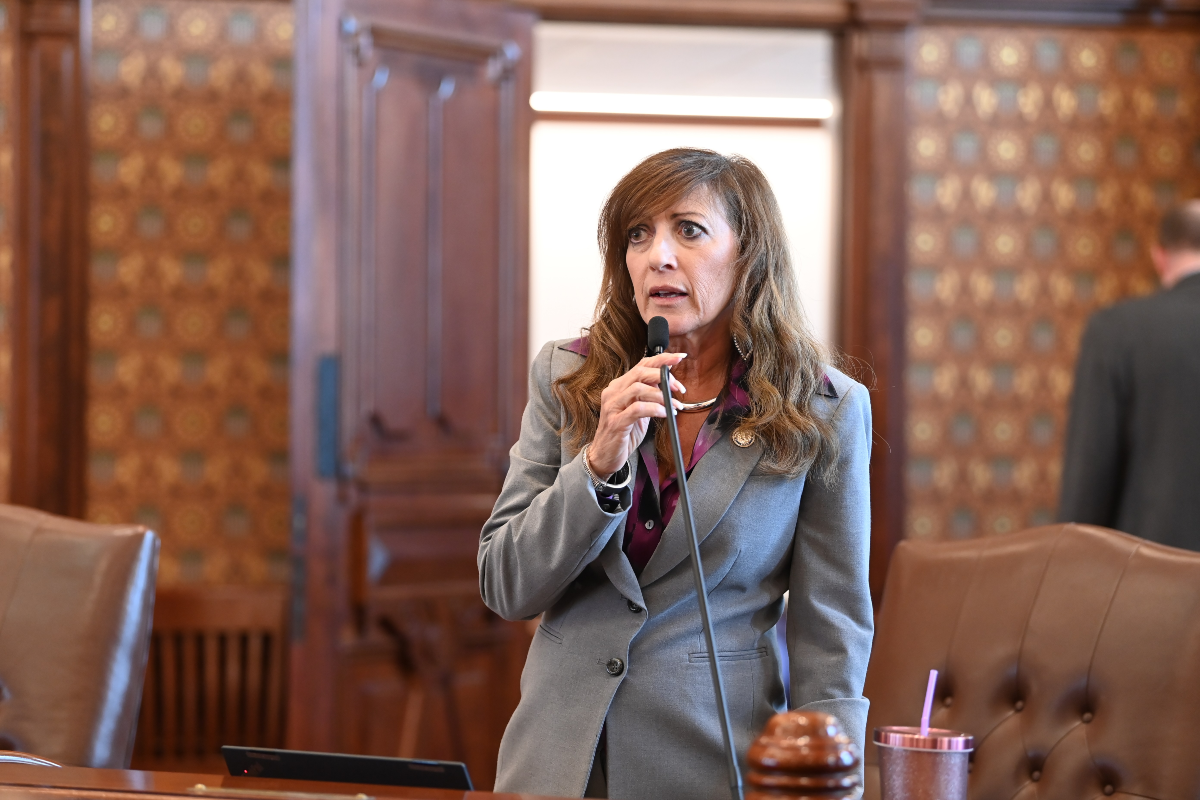 SPRINGFIELD – Senator Linda Holmes’ two-year pursuit to allow terminally ill adults in Illinois to choose to end their suffering on their own terms was passed by the Illinois State Senate Friday.
SPRINGFIELD – Senator Linda Holmes’ two-year pursuit to allow terminally ill adults in Illinois to choose to end their suffering on their own terms was passed by the Illinois State Senate Friday.
Senate Bill 1950 would allow a qualified patient with a terminal disease to request a physician to prescribe aid-in-dying medication, allowing the patient to end their own life in a peaceful manner, if and when, they choose.
“I lost both of my parents to terminal cancers, and can’t forget the helpless feeling of being unable to relieve their suffering,” said Holmes (D-Aurora). “This measure is about allowing qualified, terminally ill patients an option to consider ending their pain and distress.”
More Articles …
- Simmons Passes Bill to Protect Tenants from Rental Junk Fees and Require Lease Transparency
- Cervantes legislation to protect immigrant workers passes Senate
- Landmark energy relief measure clears Senate with Cunningham support
- Senate Democrats pass landmark legislation to enhance civil rights amid ICE activities
Page 4 of 762
